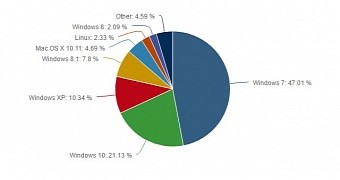Windows 10 is no longer available for free (at least, that’s what Microsoft claims because there still are ways to get the operating system without paying a single cent), and statistics provided by Net Applications offer us a look at how the free upgrade offer has impacted adoption in the past 12 months.
Windows 10 is currently installed on 21.13 percent of the world’s PCs, according to this data, while Windows 7 continues to be the leader with 47.01 percent.
As you can see, Windows 7 has indeed lost market share points, and it has dropped below the 50 percent threshold for the first time, but Windows 10 still has a long way to go in order to overtake it and become the leading desktop platform. And because this didn’t happen during the free upgrade campaign, it’s unlikely to see the switch of places anytime soon, as the Windows 10 growth rate is expected to decline significantly in the coming months.
The focus is now on enterprises
Microsoft hopes that enterprises will help boost adoption of Windows 10, as many companies are projected to reach the end of the piloting stage of the new OS in the coming months and then perform the switch from Windows 7 and 8.1. Most enterprises are waiting for the Anniversary Update to begin considering the upgrade to Windows 10, and this release is projected to start tomorrow.
Windows XP continues to be the third most-used desktop operating system in the world with a share of 10.34 percent, followed by Windows 8.1 with 7.80 percent.
Windows 10 managed to improve its share by nearly 2 percentage points during July (up from 19.14 percent), mostly because of the approaching end of the free upgrade promo, so it’ll be interesting to see how adoption goes now that this campaign is officially over.
Microsoft has also been accused of forcing users to upgrade to Windows 10, and many claimed this was a result of the fast growth of the OS in the previous month, so the next few months could bring a significant slowdown for the new OS.

 14 DAY TRIAL //
14 DAY TRIAL //